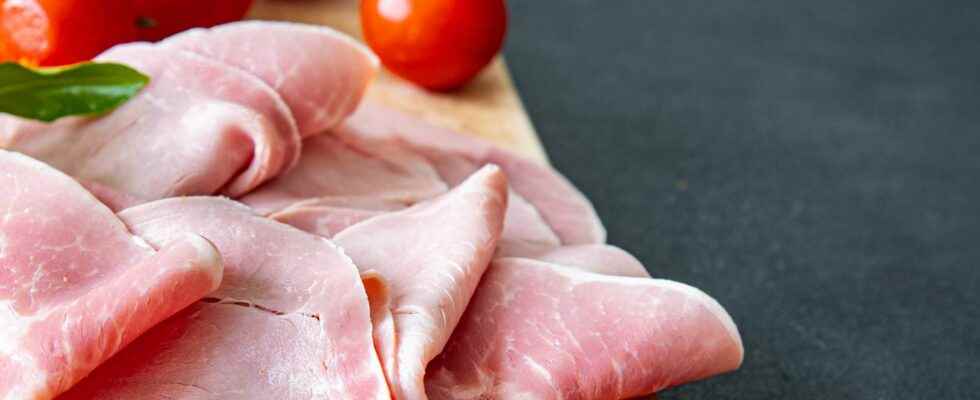You will also be interested
[EN VIDÉO] Modern food: the great advances and failures of half a century Is the food industry feeding us badly? Yes and no, demonstrates Dr. Cocaul, nutritionist and columnist at Futura. Our modern food is plentiful and well secured. However, the preparations and packaging are too attractive, while the reinforcement of sugar and salt makes it too rich, causing real epidemics, starting with obesity.
French health authorities confirm “ the existence of an association between the risk of colorectal cancer and exposure to nitrates and nitrites “, notably via processed meat, in an opinion published on Tuesday after several months of work. The National Food Safety Agency (ANSES) affirms that the analysis of the data of the scientific publications published on the subject ” joins the classification of the International Agency for Research on Cancer (IARC) “.
In 2015, the World Health Organization IARC (WHO) classified processed meat, including charcuterie, as carcinogenic (category 1). It would promote, among other things, colorectal cancers which kill nearly 18,000 people a year in France. Ingested nitrites are considered probable carcinogens (category 2A). Historically, butchers have used nitrated components to lengthen the duration conservation of products and prevent the development of bacteria pathogens at the origin in particular of botulism, a serious neurological condition largely forgotten due to health progress. These are also the components that give its color ham pink, naturally gray.
Reduce exposure of the population to nitrates and nitrites
L’handles ” recommends reducing the exposure of the population to nitrates and nitrites by proactive measures by limiting exposure through food “.
” Although reducing the level of additive is likely to significantly increase the microbiological risk », and therefore the development of diseases like salmonellosis, listeriosis or botulism, ANSES ” considers that it can be envisaged subject to the implementation of validated compensatory measures to control this risk “. For example, by shortening the use-by dates of products or by acting at the level of the manufacturing stages (bio-protection measures in farms and slaughterhouses). The Foodwatch association, the League against cancer and theapplication Yuka immediately asked the public authorities “to ban these additives”: ” Faced with scientific facts, political actors must take their responsibilities “, they say in a joint press release.
This winter, strong debates had opposed them to butchers, who defended a century-old know-how in compliance with the law. In February, the National Assembly had voted the principle of a “declining trajectory” of the maximum doses of nitro additives in charcuterie. For its part, the government had said it wanted to “wait for the return” of ANSES and had undertaken to follow its advice.
While major manufacturers, such as Herta or Fleury Michon, have already launched ranges of “nitrite-free” ham, the agency warns against substitute solutions based on “plant extracts” or vegetables “. ” This does not constitute a real alternative insofar as (these substituents) naturally contain nitrates which, under the effect of bacteriaare converted into nitrites “. “ These so-called “no added nitrite” or “zero nitrite” products therefore contain hidden nitrates and nitrites “, underlines the agency.
Define acceptable daily doses
ANSES also considers it important to better define the acceptable daily intakes (ADI) of nitrates and nitrites. Because she finds a paradox: the existence of a link between the consumption of processed meats and the risk of cancer, even though the maximum recommended doses (150 grams of charcuterie per week in France) are respected – by 99% of the population. ADIs are “ defined separately for each of these substances, whereas the biochemical mechanisms involved constitute a series of transformations towards nitrosated compounds “, underlines the opinion. Clearly: nitrates, naturally present in soils, can see their concentration increased by agricultural activities (fertilizers, livestock effluents). They are found in the plants we eat and the water we drink. In our mouth, under the effect ofenzymes bacteria, ingested nitrates are transformed into nitrites. And the latter, unstable, can, when they are present in excess, generate the formation of “nitrosated compounds”, “known for their character genotoxic and carcinogenic “.
ANSES recommends limiting your consumption of charcuterie to 150 grams per week
ANSES therefore recommends continuing research, to ” establish the toxicological reference value taking into account co-exposure to additives, but also to launch new epidemiological studies to improve knowledge of the link with the risk of various cancers. In the meantime, the agency advises to limit its consumption of charcuterie to 150 grams per week and calls for a diversified dietwith at least five servings of fruits and vegetables a day.
Interested in what you just read?
